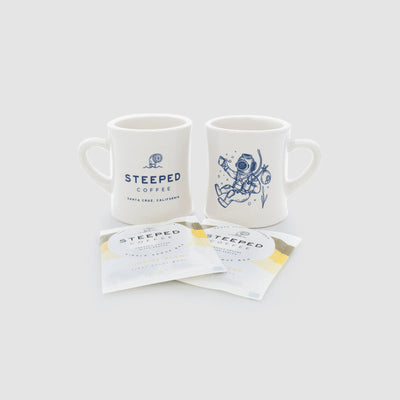Steeped Beginnings
This story originally appears on the Entrepreneur's Handbook

By Dave Schools
Josh Wilbur, a surfer from Santa Cruz who often wears a well-worn cap that says “Captain Fin” on it — his daughter’s name is Finley — is on a mission to replace the K-Cup machine in your kitchen with a new method of brewing coffee.
“If you line up [K-Cup] pods sold since 2009, they would wrap around the planet over 110 times,” said Wilbur. He and his team did the math: the number of plastic pods accumulating in landfills each year is north of 10 billion. Even Keurig inventor John Sylvan said he regrets ever making them because they’re nearly impossible to recycle, and that doesn’t even account for the machines necessary to brew one.
To solve this problem, Wilbur created the first patented coffee steeping system — a single-serve bag of specialty coffee that you place in a mug of hot water. It’s like tea, but not quite. Its name, you guessed it: Steeped Coffee.
Unlike tea leaves, coffee starts to go bad as soon as you grind the beans. In order to preserve the freshness, Steeped Coffee bags are sealed with nitrogen — so no oxygen can touch the grounds.
Also unlike tea leaves, which are larger than coffee grounds, the thread count of the Steeped bag had to have the perfect permeability to allow water in and flavor out, while not letting the tiny grounds escape into the cup. It took years of experimenting with grind settings, materials, and filter density, said the founder.
The best part? The entire product is 100% compostable and ethically sourced. Each coffee bag is made of a non-GMO food-grade biodegradable material that you can drop in your garden or toss in your green bin.
I’m an outdoorsy, tent camping kind of guy so I immediately thought of how I would use Steeped Coffee.
Imagine you’re camping overnight in the woods. You wake up in the morning and light your pocket rocket mini stove to heat water for breakfast. Once the water boils, instead of a Starbucks Via pack — something Wilbur regards as artificial and gross to drink — or a cumbersome french press set up, now you can tear open a Steeped Coffee pack and plunge the bag into your steaming cup of hot water. In four minutes, you’re sipping on a fresh cup of premium Joe.
“This new product from Steeped Coffee might be one of our favorite new ways to brew coffee on the road,” wrote Barista Magazine on Instagram.
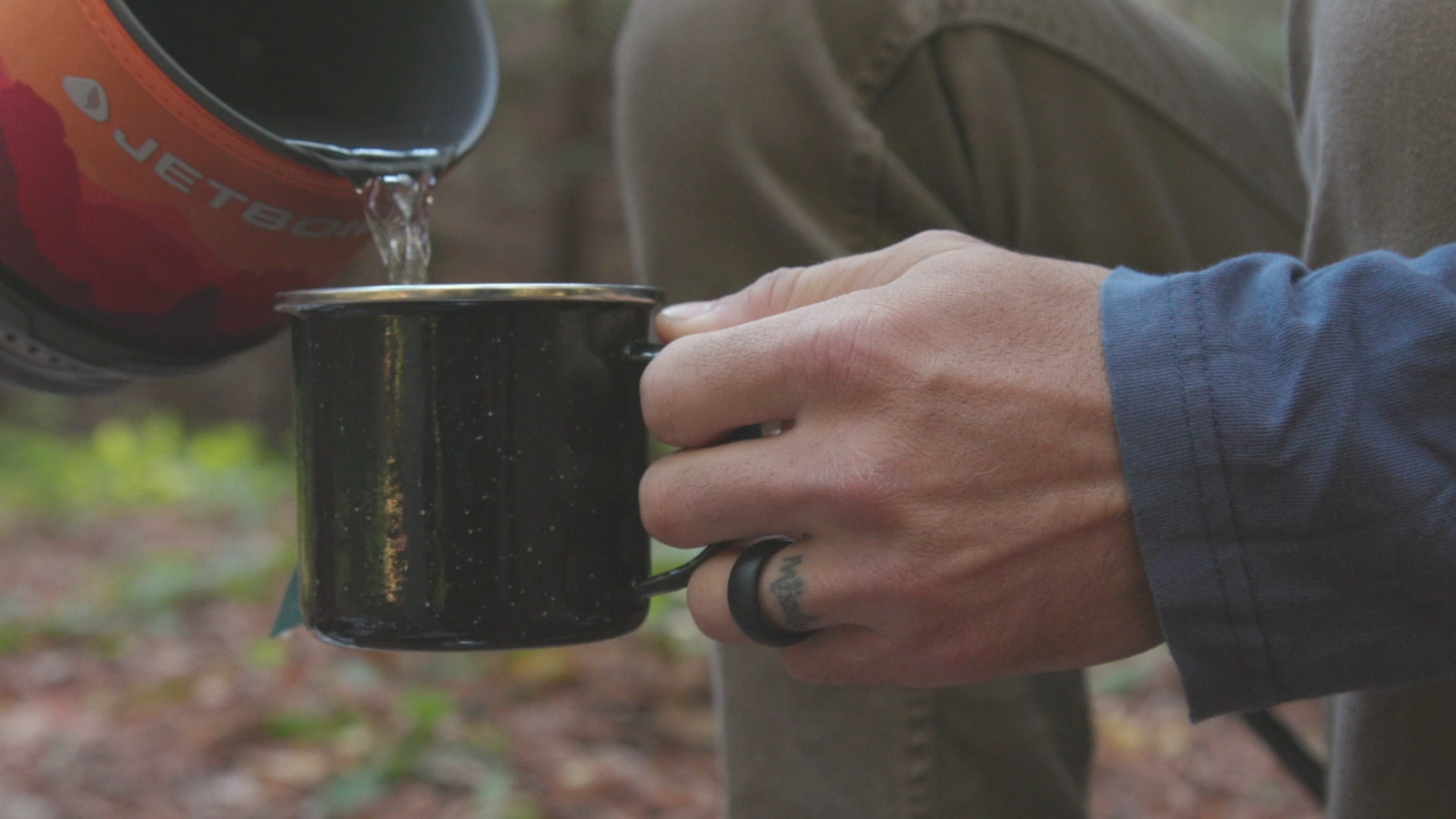
Sounds nifty, but the implications for the 48 billion dollar US coffee industry are much bigger than a camping trip. You’re likely going to see the Steeped Coffee methodology in hospitals, offices, hotels — places where single-serve coffee reigns — and perhaps on your next flight.
In other words, it could be the Fourth Wave of the coffee industry.
The “waves” of modern coffee in 50 words
Craft Beverage Jobs, a career and coaching website for beverage artisans, provides a well-written historical account of the three waves of coffee:
- 1st Wave: Coffee consumption grows exponentially.
- 2nd Wave: The definition and enjoyment of specialty coffee takes off.
- 3rd Wave: Purchasing coffee based on its origin and artisan methods of production becomes all important.
In short, the waves of coffee are convenience, specialty, and ethics.
The fourth wave, Wilbur says, combines them all: specialty + ethics with single-serve convenience.
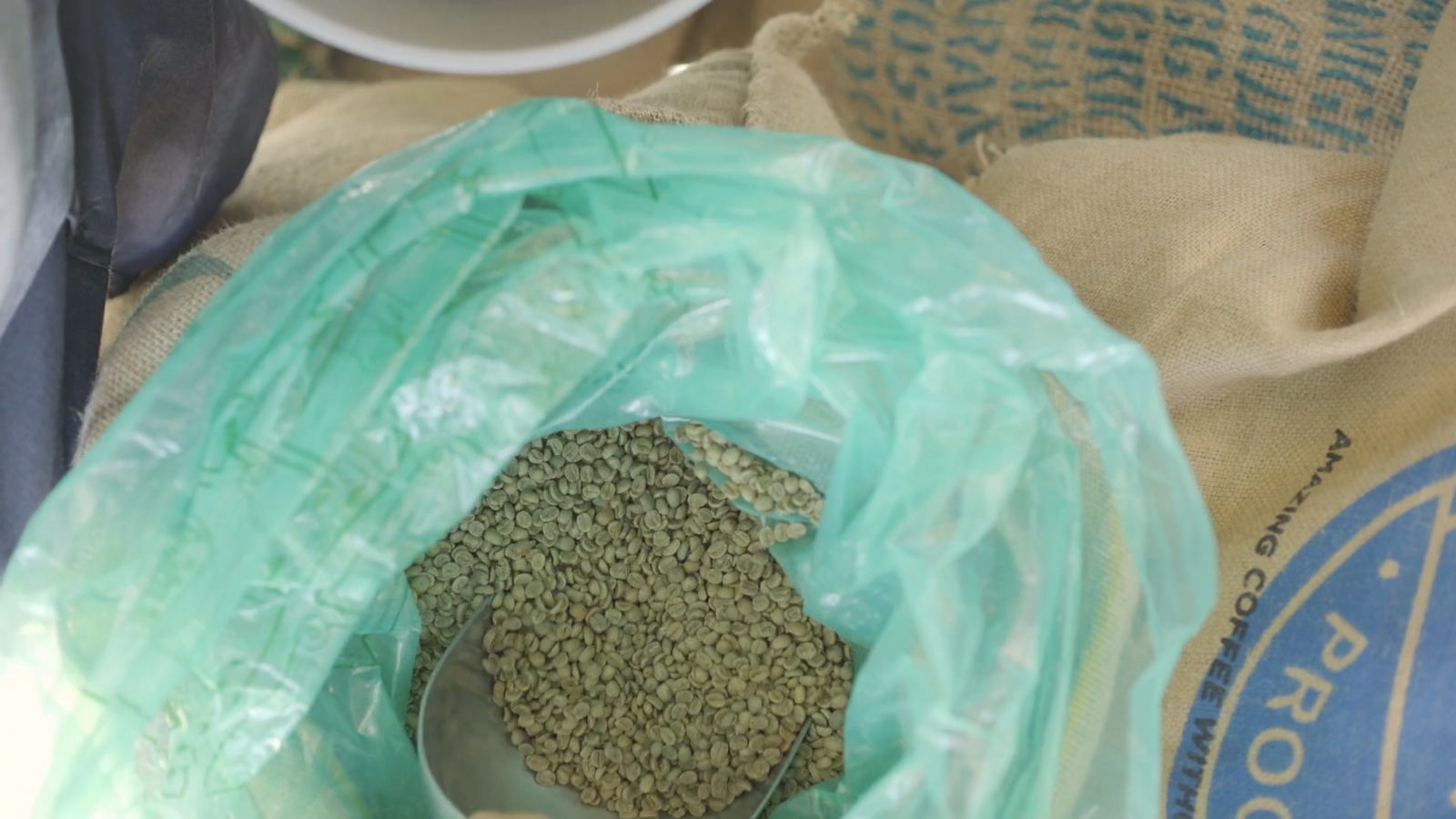
It’s a nut that hasn’t been cracked yet
Keurig has definitely made single-serve convenient. But, as we covered already, it’s missing the ethical piece.
Pour over, french press, and Aeropress are great for specialty brews, but they’re not exactly convenient. You still need to perform chemistry before you’ve made coffee.
Instant coffee is convenient, but it’s nowhere near specialty quality.
Steeped Coffee is the first patented methodology to combine the quality and ethics of specialty coffee with a convenient single-serve unit.
Sounds innovative, right? Well, in the startup world, a clever product is only half the battle. As any founder will tell you, getting the word out and finding a product-market fit is the other, sometimes more difficult half. For Steeped Coffee to succeed in changing people’s (often religious) coffee habits, Wilbur and his team will have to make it through the bowels of the Startup J-Curve.
The “Startup J-Curve”
In his book, The Startup J-Curve, author and 30-year serial entrepreneur Howard Love describes the usual path to success for startups. He says it’s not a hockey stick, but rather, more often a J-curve.

Howard Love writes that a startup usually follows this path. The six phases are:
- Create a product
- Release it into the wild and gain feedback
- Morph accordingly (i.e., pivot)
- Establish the right business model
- Step on the gas and scale
- Harvest profits and satisfy stakeholders
For Steeped, Wilbur and his team are somewhere between the second and third phase: Release and Morph. His innovation is created, and now he is in the process of releasing it and learning where it sticks.
A critical shift in focus happens for the founder at this time. The focus changes from making sure the product is as high quality as possible to bringing the beautiful and reliable product to market — and observing how the market receives it.
The clock ticks mercilessly. Any minute, competitors could apply pressure, the founder could run out of money, or a windfall of deals could overwhelm production capacity.
Going all-in to bring the vision to life
Josh Wilbur has an IQ of 152, is dyslexic, and listens to audiobooks at 4x speed. He thrives on four hours of sleep, finds himself pulling an all-nighter at least once a week, and works hard to somehow still prioritize relationships and family, he says. It’s always been that way.
How does he not crash?
Two things: coffee (shocker), and more importantly, passion.
“Ideas and dreams are tricky things. You have to find just the right one — test it, cultivate it, and then give your whole life to it to see it grow,” said Wilbur.
But passion by itself — no matter how much sleep you lose — isn’t enough. It takes capital. In January 2017, the initial investment for Steeped was $250,000 and it literally emptied everything in Wilbur’s pockets.
And more.
“I remember the day when my wife came up to me and said ‘I can’t do laundry,’” said Wilbur. “We didn’t have any quarters. We literally had zero cash in the bank. We were living off of debt. And we couldn’t do a load of laundry. ”
He remembers that day as a moment of victory, a symbolic moment that meant they were all-in and weren’t getting out. He and his wife just shrugged their shoulders and laughed… in their unwashed clothes.
You might be wondering where the quarter million dollars came from. Wilbur’s background, which might sound familiar to some of you, has a significant part to play in this story.
$1.4 million on Kickstarter to create a new Bible
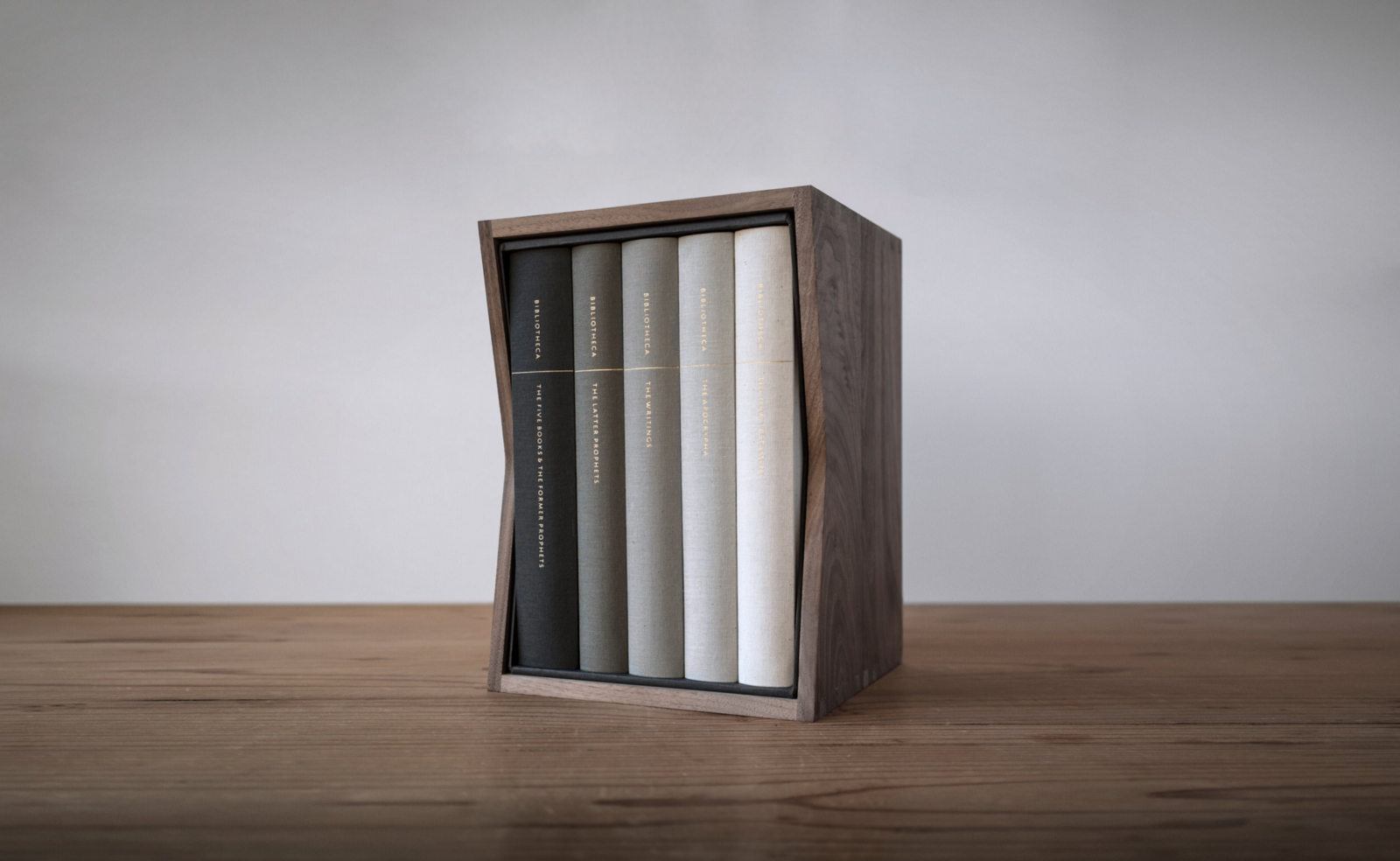
Before Steeped Coffee, Josh Wilbur’s career followed a patterned theme at each of his jobs: he brought a different, simpler experience to a popular, established industry.
He did it on the founding team of a fintech startup called PayStand, which simplified the way payments are made online.
And he did it working with his friend Adam Lewis Greene, the founder of Bibliotheca, a project to render the Christian holy book into a simplified novel-like reading format.
One day, Greene and Wilbur were getting coffee, which turned into an impromptu job interview. At the time, Greene was under the pressure. In June 2014, Greene had posted Bibliotheca on Kickstarter with the goal of raising $37,000. It exploded. Over 14,000 backers pledged $1.4 million (and a million more came from pre-sales). Caught off guard by the torrent of demand, Greene realized he had to create the project at scale and ship it to tens of thousands of bibliophiles around the world.
Wilbur agreed to work with Greene and put his vision for Steeped Coffee on the back burner. For the next two years, he fully committed to Bibliotheca. The multi-volume Bible sets shipped in time for Christmas 2016 — two years later than expected — and as the end neared, Wilbur was working 300 hours a month to help get the books shipped in time for Jesus’s (recognized) birthday.
“It’s okay to obsess, at least for seasons,” said Wilbur reflecting on the project. “The excitement of seeing a dream materialize was more than enough to fuel the final push.”
Wilbur coordinated the seven 40-foot shipping containers traveling from Germany to five fulfillment centers around the world, each containing thousands of freshly bound sets of Bibliotheca.
Wilbur learned a valuable lesson. “Don’t let perfect get in the way of good, but if you have the opportunity to make it perfect, you should.”
Additionally, the Bibliotheca experience taught Wilbur about global logistics, manufacturing, and managing mountains of spreadsheets — skills that would later be fundamental to his own startup’s success.
So where was Steeped Coffee all this time?
“It was always bubbling up,” said Wilbur. He came up with the idea seven years before but kept it tucked away in a notebook and only tinkered with it on nights and weekends. When Bibliotheca finished up, he paid off his debt and reopened the notebook.
What he did with online payments and then Bibles — designing a different, simpler experience in a popular, established industry — he aims to do in an even bigger industry: coffee.
What does it take to bring a new way to brew coffee to the world’s doorstep?
Some might think Kickstarter is enough to get the word out about a product. But not really. Not at all, actually.
“We used Kickstarter only to launch our B2C channel,” said Wilbur. The campaign, which had a goal of $22k and raised $36k, just ended. It served its purpose, said Wilbur, who’s very excited about the newest 750 people who joined the Steeped community.
But he has a much bigger vision in mind for Steeped Coffee beyond Kickstarter. On top of a B2C channel, he has a B2B and a B2R (business-to-roaster) channel in the works. B2R means he licenses, packages, and produces other premium coffee brands using the Steeped Coffee bag technology, similar to a private label agreement.
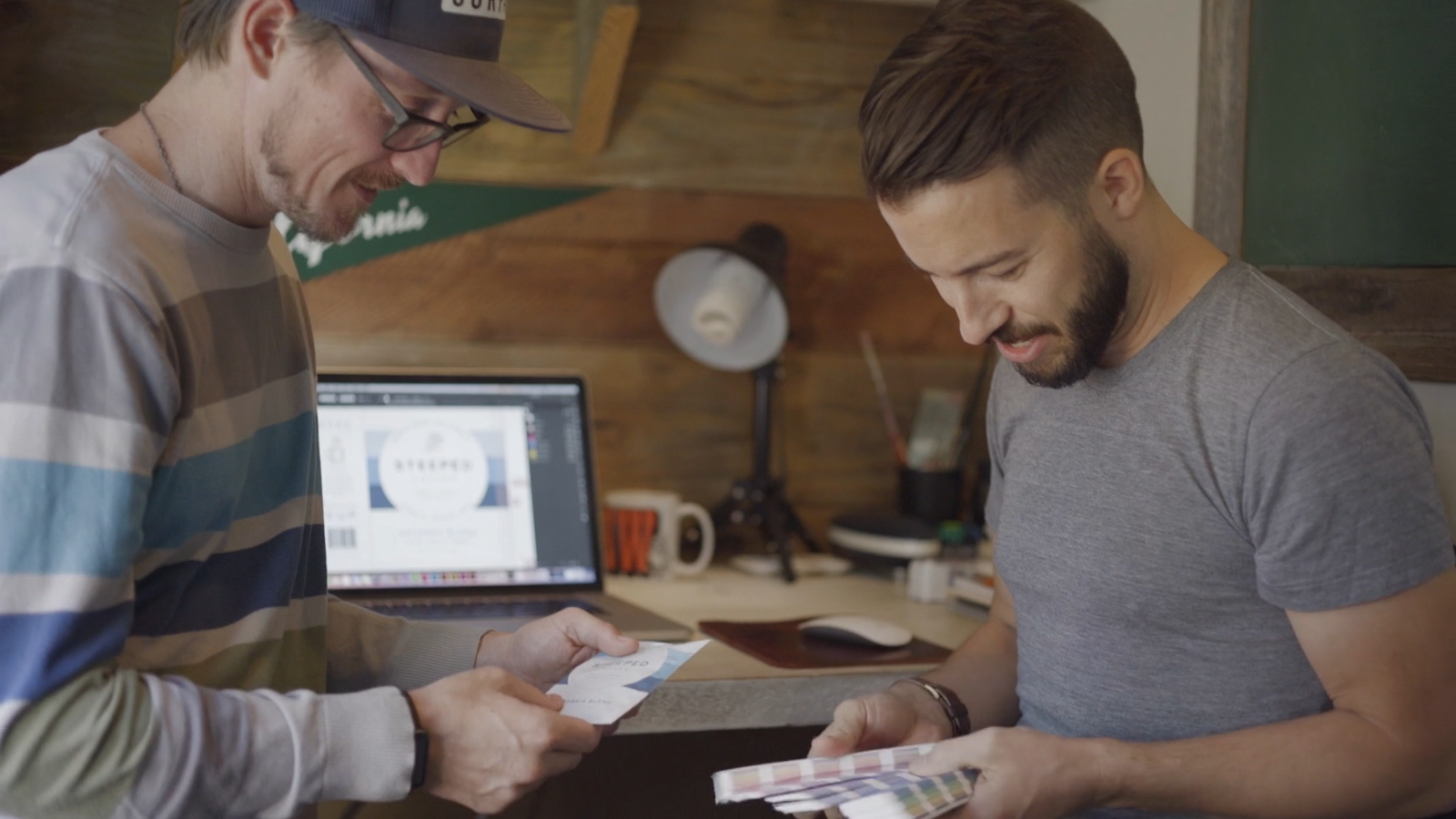
“Premium coffee roasters have shied away from offering their specialty grounds in single-serve packaging because it’s impossible to keep the grounds fresh and ruins the taste,” said Wilbur. “With our nitro-sealed bags, oxygen is replaced with nitrogen so the coffee stays fresh as if it was ground moments ago.”
Steeped Coffee is in the process of securing such partnerships with several well-known brands, each serving its own specialty coffee in Steeped Coffee bags.
Wilbur envisions a strong B2B play as well, targeting every venue that serves single cups of coffee. Hotels, hospitals, airlines, and universities are all on the list.
When I first met Wilbur and heard his pitch for Steeped Coffee, I thought it was a cool gig. It seemed like a coffee startup with a neat niche product to sell online, kind of like selling t-shirts.
But I was wrong. Steeped Coffee to the coffee industry is more like Twitter to the social media industry. Hear me out.
Compared to LinkedIn, Facebook, Instagram, Pinterest, and the slew of other social media sites, Twitter is the dark horse that doesn’t have a central, dominating use case. Sports, politics, music, culture, networking, breaking news — the list goes on. Twitter can be found everywhere and works for everything, but nobody knows exactly what it’s best for. It’s difficult to define and put it in a box. Perhaps, by design.
I believe Steeped Coffee is the same. It has the potential to be used for everything and it works anywhere you can heat up water. But as far as which niche it will settle into, it’s anybody’s guess.
That’s why Wilbur bought a 7,500 sq. ft. production facility to get started. He wants to scale at lightning speed and inject his methodology into every industry that will take it. The morning of the day we talked he just closed the first injection of capital, $100,000, of a $2 million seed round.
“This is not a mom and pop operation,” said Wilbur. “We’re going to be pumping out hundreds of millions of Steeped Coffee packs a year as we scale.”
I had the chance to walk through his warehouse in Scotts Valley, California, outside Santa Cruz. It’s huge and relatively empty right now. There’s one primary manufacturing machine in it. Wilbur said he wants five at this location.
As an outsider looking in, it seemed extremely risky to me. How does he know it will work?
He looked at me and said, “Drip coffee is on the decline for the first time since they started measuring it in the sixties. Specialty coffee is growing 20% YoY and single-serve coffee is growing 30% YoY. We are taking two major trends and putting them together for the first time.”
“Wherever you see a single-serve coffee machine (i.e., Keurig), I hope you will soon see a Steeped Coffee bag…”
He smiled.
“…instead.”
“It’s not competition,” he said. “It’s justice. People deserve high-quality and convenient coffee that doesn’t cause problems for our natural environment.”
Wilbur doesn’t consider himself a competitive person, although I highly doubt that, yet his chill beach vibes back him up. His laid-back demeanor, approachable presence, and boyish excitement might lead one to underestimate an insatiable ambition.
What it takes to compete with Keurig
The New York Times wrote that coffee is a saturated market. Between the behemoth coffee chains like Starbucks and Dunkin Donuts, the specialty shops like Blue Bottle and Stumptown, the grocery store brands that only baby boomers love like Folgers and Maxwell House, and Keurig’s stranglehold on the pod market, it appears Steeped Coffee has to surmount a Great Wall of Coffee and the giant one-eyed Cyclops named Keurig guarding it.
But this is not so. In fact, the more players in the game the better for Steeped Coffee.
“Competitors are partners,” said Wilbur. “Whoever wants to sell their beans in a Steeped Coffee bag, can. We’ve got the whole process dialed and can help make it easy to use our Steeped method.”
So, really, Wilbur isn’t competing with brands. He’s competing with methodologies such as drip, pod, and french press. It’s not a like a Windows or Mac decision. It’s more like a laptop, tablet, desktop decision.
How an entrepreneur weighs the risk
As an entrepreneur, when Wilbur steps back and views the big picture, as intimidating as it might look, he finds courage by asking an honest question.
“What’s the worst case scenario?” he asks. “We’re blessed enough to live in a country that encourages entrepreneurship and mitigates the risk of disruption. As long as our basic needs are met, why not go all out for it?”
And his wife agrees. She said as long as she has health insurance and organic food on the table for their young family, she’s happy.
Josh Wilbur exhibits something I repeatedly observe in startup founders when I interview them. They’re stone-cold machines when it comes to risk. It’s all math. One founder I interviewed sold her half million dollar house to buy Adwords so that she could scale her app’s user activity and glean deeper audience insights.
She sold her house for an app.
For a founder, emotions are there, but they’re one hundred percent housebroken. “Every day something goes wrong,” said Wilbur.
“How do you handle it?” I asked.
“It’s a matter of quickly changing your perspective to the new reality,” he said, the old serene one replaced with one in flames. “In this new reality, you say, ‘Okay, what are my options?’ Research, assess, and decide the best way you can move forward. You often end up in a better place than when you started.”
“What about when you make a mistake?”
“Hindsight being 20–20 doesn’t mean regret. When you make a decision, commit with two feet. Once your decision is made to the best of your knowledge and ability at that time, you can’t let yourself regret it, you can only learn from it.”
For someone who is inventing a new method of coffee brewing, I would think one would need to have such a mind of steel and discipline.
So will Steeped Coffee become a thing?
There’s only one way to find out.
Heat up the kettle, plop one in, and sip. Apparently, Wilbur says, the taste changes character depending on how long you steep it.
For Wilbur, running a startup isn’t letting him get out on the ocean waves and surf as much as he used to. He misses it, but not too much. He’s been waiting too long to surf a different kind of wave — the Fourth Wave of Coffee — and he’s lining up to get pitted.
